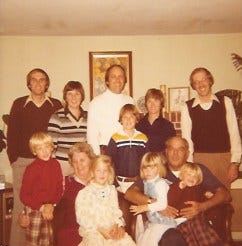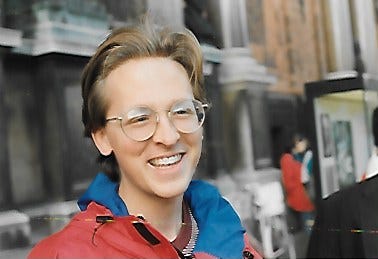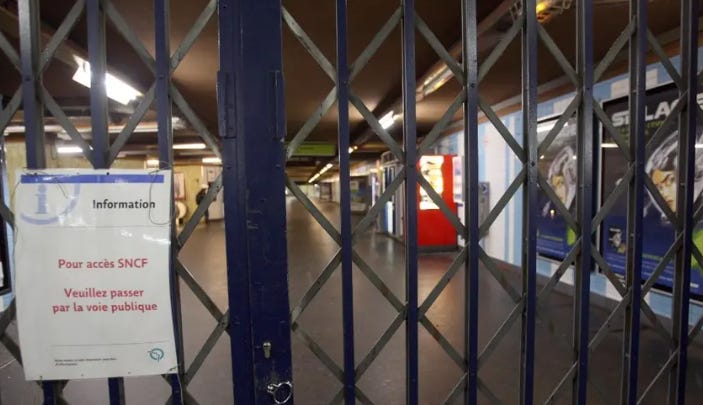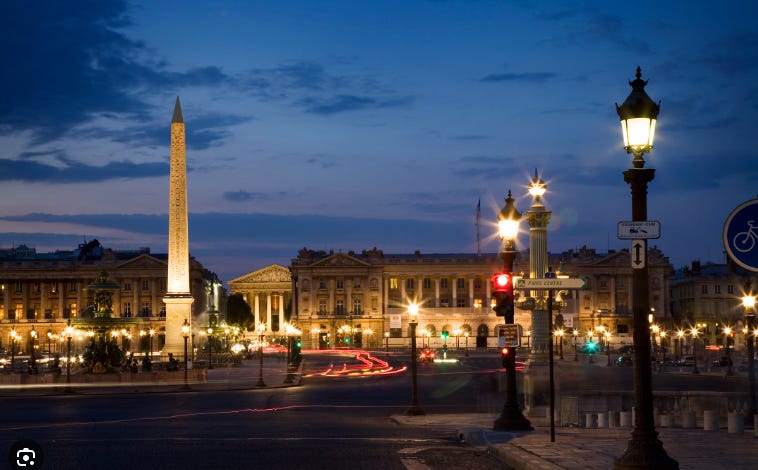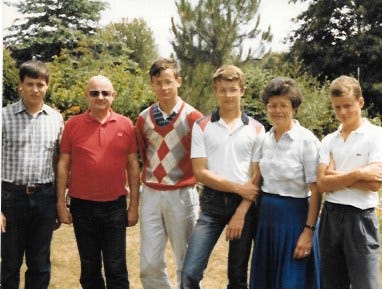[ad_1]
DISTANT PAST
My family moved from Horsham, PA to West Hartford, CT in 1973. For the next six years, we would make trips back to Pennsylvania for holidays such as Easter, occasionally Christmas, but always Thanksgiving. The Marsland clan holiday was Thanksgiving, and was spent in Parkerford with my Nana and Pop pop.
During the decade that my wife and I lived in Philadelphia, we made the trip to CT and back many times. The experience of a five and a half hour drive as an adult is soooooo different than that of a child. You have a steering wheel in your hands, your foot on the gas and brake pedals, and must pay attention. Driving is the most complex behavior which many of us engage in on a regular basis, judging distance and speed, calculating risk, and exercising situational awareness.
As a child in the backseat, five and a half hours was a prolonged period of boredom, counterbalanced by the adrenaline-filled anticipation of seeing my grandparents. My little sister Sharon would be seated in her car seat between me and my older brother John. Our occasional squabbles were limited by my mother’s sharp fingernails. There weren’t the tools of distraction which contemporary parents use, such as CD players extending from the ceiling or mounted on a headrest. The Sony Walkman hadn’t been invented yet. Thankfully, I was a reader, and could spend some time engrossed in a book. Still in elementary school, I made my way through The Kent Family Chronicles, which were adult novels of adventure and romance by American writer John Jakes.
I didn’t recognize landmarks, but my body knew when we were getting close to Parkerford because of the change in texture and pattern of the roads. There was a series of stop lights as we drove through Phoenixville and and past Spring City; some railroad tracks we would cross over, and then the left turn at the light off of Rt 724 onto Old Schuykill Rd. I knew that intersection, and felt the slower speed of the car for the next few minutes. My excitement grew until we turned left onto Zeiber Rd, reached the crest of the hill, and turned right into Nana and Pop pop’s gravel driveway.
Nana must have heard the crunch of tires on gravel, and would be at the door to greet us with a big wet kiss. She smelled like Dove soap. As I entered the tight space between the kitchen door and the basement door, I could smell a combination of cooking smells, with lingering elements of natural gas from the stove pilot light, cigar, and old wood. I swear that I could smell the Froot Loops among the little cereal boxes she would keep in the oven for our visits. (Why keep cereal in the oven, I will never know!) There was gentler, warmer lighting of incandescent bulbs, long before LEDs became pervasive. We would bring in our suitcases, and I would take a minute to bounce on the twin bed on my side of the room which I would share with my brother, listening for the reassuring squeak of the old box springs.
Pop pop would still be at the service station he ran in Norristown. I loved my Nana, but I adored my Pop pop. His return home was my highlight of our visits. He would be wearing his dark blue Dickie’s work shirt and pants with his black workshoes. He smelled like cigar and sweat with hints of gasoline and oil. He had a big smile of crooked tea-stained teeth, a rich laugh, and baritone timbre to his voice.
Before we could get down to playing a card game of Hearts or Oh Hell, or dominoes if it was later, Pop pop had to tally up the day’s receipts. He had an old Phillies cigar box, and I could smell the cash as he counted bills, doing long addition with a pencil and piece of paper. It was all so tangible and immediate.
As I drifted off to sleep, I could hear the tinkle of the old radiators, and in the middle of the night, my Pop pop’s snoring from the adjacent bedroom. Because of his work, he was an early riser both during his working years and in retirement. We kept our bedroom doors open, and even if I wasn’t ready to get out of bed yet, I could hear Pop pop’s footsteps on the hardwood floors as he passed our bedroom. I could smell the whiff of cigar smoke as he lit up before going outside for a walk. I didn’t need to ask “Are we there yet?” I was home.
RECENT PAST
In the Fall of 1989 I was attending Denmark’s International Study program (DIS) in Copenhagen, Denmark. I was a Business Economics major back at Susquehanna University, a small liberal arts college in Central Pennsylvania, and was enrolled to study international business at DIS for my entire junior year. When Winter break came, I flew to Madrid, Spain to meet up with my friend Kelly Hayner, a former Susquehanna graduate who was now teaching English. It was a great visit, with late-night dancing, standing meals at tapas bars, and several day excursions. We paid a visit to Museo Reina Sofía, where Picasso’s Guernica and all of the steps leading up to its creation are displayed. We also traveled to Segovia to see the Roman aqueduct and its Gothic cathedral.
At the end of our visit, I boarded a plane in Madrid, with plans to land in Paris. When I was a teenager, I was an informal exchange student with la famille Tardiveau near Nantes, and intended to visit them again. The weather goddess had other plans, and, less than an hour after takeoff, our plane was diverted back to Madrid, where we were placed on a train instead. It was chaotic; babies were crying, kids were whining, and tempers were short.
There are more pigs than people in Denmark, and few people outside of Denmark would bother learning Danish, because most Danes speak excellent English, and German, and French. I noted that when Danes are traveling abroad, they are comfortable expressing themselves without restraint in their mother tongue, as they can rightly expect that no one else will know what the hell they are saying. I enjoy languages, and as usual was motivated by romance and lust, so took up studying Danish during my first semester at DIS.
Back to the train. I knew that the passengers were getting to the end of their patience, when I heard a deep man’s voice yell “Hold kæft!”, which is a crude way of saying shut up in Danish, in response to another passenger’s crying baby. Thankfully, the train arrived at the Gare Montparnasse within the hour. Unfortunately, it was now past midnight, and no trains were running again until 6:30am.
Being a college student with limited funds, I figured that I would just find a corner and doze against my backpack until later that morning. Two members of the Police Nationale and a nasty German Shepherd had other ideas, and sent me packing. They did give me space to stow my backpack in a locker, but a few minutes later I was standing outside the station getting the once-over by several prostitutes. I proceeded to walk across the street to enter an open cafe, thinking that I would hang out there for a while. I ordered an omelet with jus d’orange and half a baguette. I was about to order coffee when the waiter let me know they were closing. It was only 1:30am! I paid my bill and walked outside. It must have been a slow night, because the same prostitutes were giving me looks of reconsideration.
I flagged a taxi, and in my adequate French explained that I was looking for a restaurant that was open all night. He obliged me, and dropped me off on a street corner which had an open restaurant on each side. I walked up to the door which was closest to me, and as soon as I entered, felt out of place. Everyone looked like they had just come from the opera, wearing tuxedos and full-length dresses. I was wearing a red Marmot shell over a flannel shirt with blue jeans and hiking boots. The maître d’, without hesitation escorted me to a two-top with a fine linen tablecloth. The equally professional waiter arrived but a moment later to deliver a menu.
Everything on the menu looked good—and expensive! I picked the least expensive item I could find, which was a broiled white fish, which came with cream sauce, blanched asparagus, and a delectable whipped potato creation. I drank from une carafe d’eau, not daring to get into the wine list. I ate v-e-r-y s-l-o-w-l-y, but still, when I finished, it was only 3:00am. I paid my bill, walked out of the restaurant, and across the street to the other restaurant!
I’m not sure how to describe this third restaurant. It was brightly lit, and bustling with customers. The menu was eclectic, and I was not starving for sure, so I decided on a chef salad. When the salad arrived, it was huge! There were FOUR hard-boiled eggs, sliced in half, a generous amount of sliced ham and cheese, tomatoes, different types of lettuce, red onions, olives, and a lovely vinaigrette. I dug in, and even had some buttered baguette on the side. When I finished, it was…4:30 am.
I left the restaurant, thinking that I would get a cab, but when I counted up my remaining Francs, I realized that I had just enough money left to buy a train ticket. Well, then I could use the Metro. Wrong. The Metro stops were shuttered by iron gates. I didn’t have a map, but had been here three years before, and using the maps in the bus shelters I began to make my way back across the city to Gare Montparnasse. It was surreal. There was hardly anyone out and about, just a rare taxi and no other pedestrians. I walked by the Obelisk on Place de la Concorde, Jardin des Tuileries, the Louvre and its pyramid, all dramatic light and shadow in their spotlights. At first I was scared, but then just accepted my fate and enjoyed myself.
I arrived back at the Gare Montparnasse around 5:30 am, and it was starting to come to life. I got in line to buy a ticket to Nantes on a train leaving at 6:30am. In my well-structured but poorly pronounced French, I told the ticket counter clerk, “Je voudrais un billet pour le prochain train pour Nantes.” I.e. I would like a ticket for the next train to Nantes. The price of the ticket was unexpectedly low. I puzzled over this as I walked away, and as the minutes ticked by I came to understand my mistake. The clerk had heard my prochain (next) as chien (dog), and issued me a ticket for a dog!
It was now 6:00 am, and the ticket line was long. When I reached the clerk, again, I summoned up some indignity. (If you’ve ever heard an indignant Frenchman saying “Incroyable!”, you’ll understand). With pained emphasis and pronunciation, I said, “Je suis pas un chien (I’m not a dog), je suis un humain, et je voudrais, un billet, pour le prochain train pour Nantes!” Ah, this time he understood: with a quick grimace, he accepted my old ticket and issued a new one.
I got to the train about five minutes before departure. It had been more than twenty four hours, one train ride, two Police Nationales and one German Shepherd, two prostitutes, one taxi drive, three restaurants, three excellent meals, one very long and lovely walk, and one train station clerk, but I was finally on my train. I was already dreaming of the cozy bed awaiting me chez Tardiveau.
PRESENT
Several times this week during patient visits, I fielded some form of the question: “When can I stop taking ______ prescription medication?” I usually respond with a question to try and gauge the patient’s willingness to continue—indefinitely. “What are your concerns about continuing with ______ medication?
Given that we are talking about post-acute sequelae of COVID (PASC) and vaccine injury, the relevant medications are most often IVM, LDN, Ketotifen, Eliquis, Plavix and Aspirin. But patients are also weary of taking fistfuls of supplements, and will ask about NAC Augmentata, Nattokinase, Lumbrokinase, etc.
When the patient’s primary concern is cost, I try to help them discern what the priorities of treatment are in each case, keeping in mind that there can be significant differences between patients. That is why I like the low-cost or free interventions such as intermittent fasting, extended fasting, grounding, prayer, meditation, cold-water showers, Baobab, Lithium, and alkaline water.
More often, patients just don’t want to keep taking a prescription drug. In part, it’s a self-image issue. Most patients with PASC and vaccine injury were high-performers in their lives before COVID. Their self-perception didn’t include having a pill organizer the size of a laptop with color-coding, nor did they expect that their Saturday night routine would include filling said pill organizer. Bless her soul, my wife got me some super-thoughtful Christmas presents last year, and not that a pill organizer wasn’t thoughtful, but damn, that wasn’t on my wish list for Santa.
I don’t have a crystal ball and, certainly, the front-row seat I have had to this genocide in progress has colored my perspective. Yup, I used the g-word, and mean every syllable of it. I expect patients (and you, dear reader) to take what I say with a boulder of Pink Himalayan sea salt. Yet I have a perspective that I think is worth sharing, otherwise I wouldn’t be spending some of my few free hours writing this.
Spikopathy is instigating a list of pathologies longer than…Fauci-Pinocchio’s nose during a recent congressional hearing. The world is contaminated with spike. Our bodies are contaminated with spike. I don’t know when or if that will ever end. Spike is provoking microclots, in all of us. Microclots provide refuge and mobility to metastatic cancer cells. Turbo cancer is a real thing, and in case nobody close to you has been diagnosed with cancer in the last two minutes, I’ll say that it arrives in the middle of the night and doesn’t wait to kiss you goodbye in the morning.
IVM blocks the influence of spike on platelets and red blood cells (RBCs), so that they are less inclined to aggregate and activate into microclots. LDN decreases the cytokine IL-6, a provocateur of mast cell activation, clotting, and cancer. Ketotifen stabilizes the mast cells which can be connected to every symptom a person has, from head to toe and everything in between. Because mast cells survive two to four years in our body, attending to their misbehaving ways is a priority. Eliquis, Plavix, Aspirin, Nattokinase, and Lumbrokinase are all helping our bodies cope with the burden of microclotting. NAC Augmentata breaks the disulfide bond between spike and ACE2 receptors, smashing spike into nearly 100 fragments so that our liver can break it down further and we can pee it out of our bodies. Every one of these therapies is doing something very important.
The comparative mind is a source of tremendous human suffering. “I look around and see everybody else living their lives, doing what they please, and they aren’t taking these drugs or supplements, they aren’t fasting, they’re not paying to speak with you every month. So, I ask again, how long do I have to take these drugs?”
Well, I can be blunt. First, there weren’t any classes in school about how you heal people from an intentional bioweapon. This is an on-the-job living classroom situation and we’re learning as we go. Second, third and fourth: how long do you want to live? How well do you want to live? How much of your mind do you want to keep? If your answers are, a long time, as well as possible, and all of it, then I would advise you, don’t stop taking those pills and potions.
Over the last thirty years, it has been my tremendous honor to be present as countless fellow humans grappled with their mortality, and often, while they passed over to the other side. For every person whose chronic illness has engendered bitterness in their soul, there is another who has made lemonade out of lemons, asked themselves what lessons they are meant to be learning, and made significant changes to how they live, in order to keep living. Sometimes these are people who are near death, but they are extracting meaning from their journey. By the calculus of Holocaust survivor Elie Wiesel: pain without meaning equals suffering.
Many of you had your eyes and ears open long before the lies and coercion to be vaccinated came tumbling down from on high. I was slower to pick up the plot, but I’ve been busy catching up. The last people I would be watching for clues about what to do next are the people who are doing nothing. I mean the people who are living their lives without a care, because they didn’t get a bad batch shot, and, by golly, those boosters were no trouble either! The time for wishful thinking is long gone. Never before in the history of humanity has our capacity to look squarely at reality been so important to our survival.
P.S. My colleague Dr Mobeen Syed or Dr Been has returned his focus to his medical education company, and recently completed a course on pain titled DEA Requirement for Opioid Use Disorder Management. For the medical professionals who read Lightning Bug: if you have suffered through tedious lectures which reinforce the pharma-influenced narrative in order to meet your obligatory CMEs, Dr Been’s lectures are a joy to behold. He is a brilliant and talented teacher, and you will learn concepts of anatomy, physiology, pharmacology, and practical treatment which will make your daily practice more interesting, and more effective. The cost is also very reasonable. For both practitioners and laypeople alike, I highly recommend the second lecture in this series, in order to understand the dynamics behind the chronic muscle pain which so many of us experience as a result of the spike protein.
P.S.S. I have no financial interest in Dr Been’s company.
[ad_2]
Source link

